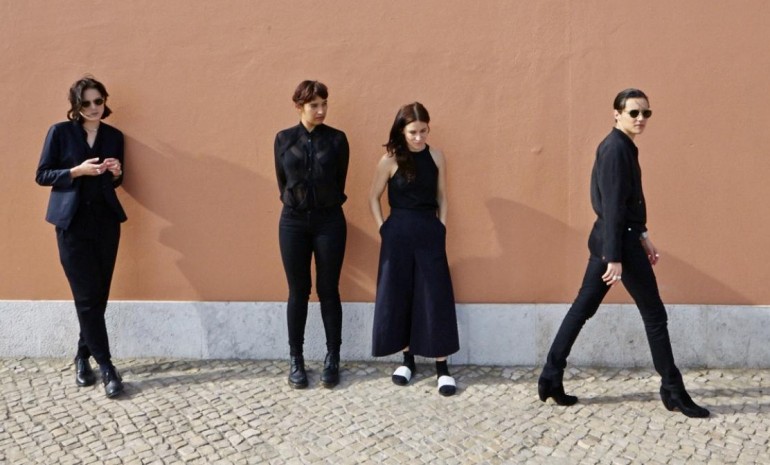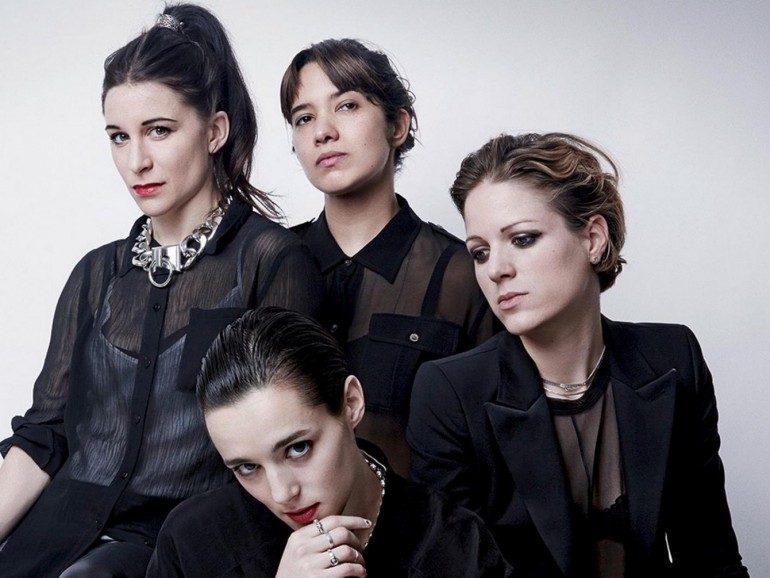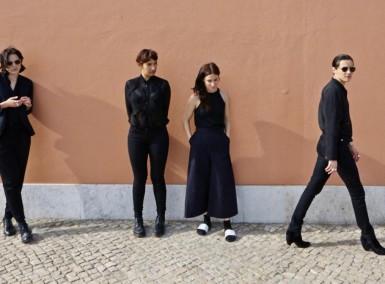
Photo by Collin Lane
When SAVAGES released their first album, Silence Yourself, back in 2013, they rocked the London music scene with their powerful and intelligent sound. Now, after two years of touring, finding new influences and meeting their faithful audiences, the band has returned with a much anticipated second LP, Adore Life, to be released on 22nd January.
A second LP is always going to be a litmus test of a band’s endurability; with Adore Life, SAVAGES pass this test with flying colours. This album was introduced to us as an album of many concepts, but, ‘most of all it’s about love, every kind of love. Love is the answer.’ If Adore Life is indeed about ‘every kind of love’, it certainly doesn’t shy away from the idea in all its complexities. Whether with their sound, their lyrics, or their intentions, SAVAGES are a band that always mean more, and shouldn’t be taken on face value. And their latest work is no different.
NOTHING BUT HOPE AND PASSION met French lead singer Jehnny Beth to discuss Adore Life, their past projects and her adversity to nostalgia. As the last interview of an arduous day, Beth could be forgiven for being a little drained. But as soon as talk turned to music and the ideas SAVAGES had for their latest album, the impassioned and articulate approach found in each the band’s songs shone through in her responses.
Moving from London’s club scene to larger venues, how does a change of atmosphere affect your sound?
Jehnny Beth: We played festivals very early on. When we were on tour for Silence Yourself we were exposed to various kinds of environments and we went around the world. We were in contact with our audience, which was different in different countries. America, Japan or Australia would be different to Europe. That was a real learning experience, seeing how it would resonate with different people.
But I love both clubs and festivals. I love the club environment because it gets very sweaty and very intense; and I love festivals because they allow for a bit of silliness – people are open to crazy shit because they’re in a party mood.
You performed at Banksy’s Dismaland this year. What’s it like to perform your art within the context of another art project?
JB: I think the fact that you insist on the venue is interesting because we consider the context whenever we play. It is important, and playing at Dismaland didn’t really change the show. A show is a show; and we have this characteristic that, wherever we play, we’re still ourselves. What was interesting about playing in the park was that we were surrounded by paintings and contemporary art, so we felt that we were very much part of the art which was being shown there. This was an absolutely comfortable place to be.
‘We’re so trustful of the music we listen to.
We let it change us, we let it affect our mood and let it into our consciousness.’
People often refer to you as ‘Post-punk’. Do you think that’s a lazy description?
JB: That’s a term that was put on us from very early on, and one which we’ve never felt much attachment to. I’m just indifferent to any labels; I don’t want that label to define me and I don’t have anything to give back to it. I am not emotionally attached to it at all. So when we went on to write the second record, it was something we had to ignore.
Also, I think we must be careful with nostalgia. Especially in guitar music, nostalgia has poisoned the scene and the artists.
JB: This reverence to the past, the idea that you were born at the wrong time; that what was exciting in guitar music happened when your parents were young. What is exciting today, and what is on the radio is R’n’B. What’s making the trends is Electronic Music, Hip Hop and things like that. This is music I listen to as well. But, in a sense, guitar music has been more underground recently.
Weirdly, when we started writing the second record, I went through a phase of listening to a lot of 90s records, of 90s guitar records. And perhaps unconsciously I was trying to go back to a time when guitar music was making the charts. I have a feeling it’s changing. And there’s also space for every genre. I listen to such a wide variety of music and I expect other people to do the same.
Do you see your music as a manifesto?
JB: Music is a powerful thing, in the sense that we’re very open to music as people. When you have a feeling or an emotion, you’re going to delve into music that will help enhance that feeling or make you feel it more deeply. That, for me, shows that we’re so trustful of the music we listen to. We let it change us, we let it affect our mood and let it into our consciousness.
That is a powerful thing, and there’s a responsibility when you realise that as an artist. Music has an impact for people. It has the power to change lives, it has the power to change consciousness… maybe ‘changing lives’ is too much, but it has a certain power. I think it’s little details that actually change people.
So, for SAVAGES the message and the music go hand-in-hand. I think it’s the nature of the four of us having an equal influence on the project and each having something personal to put in. I write all of the lyrics for SAVAGES and I am very lucky to be working with musicians who are interested in the meaning of things – who want to express something with their instruments that they can get behind. Often they are curious about the lyrics and they want to put that into their writing.
The powerful image of the woman’s fist stands out on your album cover. Does combining this fist and the title Adore Life turn the phrase into a command?
JB: We tried many things with the cover, and we wanted Adore Life as the title. If you put flowers under the title, suddenly Adore Life sounds really romantic. So, for us, we were very conscious that the artwork and the title needed to represent what was inside the record. And the record is about love but also the byproducts of love – such as the fear of abandonment and jealousy. It’s quite a schizophrenic record. It has many contradictions and it’s quite anxious at times – disturbing, uncomfortable and abstract. So to use Adore Life and only emphasise the romantic side of these words didn’t reveal what was inside the record.
The fist was a way to say, ‘Yes, adore life. But it’s not going to come easily. It is something you have to fight for as well.’

Photo by Tom Hines
‘When we play a show we are very conscious of the journey.’
Do you think your first album, Silence Yourself, was a springboard for this one? Or was it something to which you were constantly looking back?
JB: I see the two records as a diptych – there’s continuity between them and one informs the other. Both records have a similarity, in that the context in which the band evolved at the time of writing influenced the content of the record.
On the first record, we were rebelling against a scene that we felt was too sleepy. It seemed that, at the time, bands our age felt that they had to soften their message or soften their sound in order to make it. We consciously made a step against that, to differentiate ourselves. We felt quite alone in this – with perhaps the exception of BO NINGEN in London, who were really the only band that we would go and see again and again, because they were providing a proper show.
The context of the first record was also making sure that we wouldn’t take decisions that weren’t in tune with the integrity of the music. We were trying to acknowledge the power to say ‘No’ to things and choose the right places for our music.
And for the second record, what happened was that we toured, we met our audiences and they gave us so much affection and warmth – an interest, a real, genuine interest. It was a love that we couldn’t ignore. It was the acceptance of that love which changed us. We acted upon it. It was a way for SAVAGES to realize that savagery was also good-natured, openhearted and alive. It was the acceptance to love and be loved – to say, ‘Yes! I am alive and I’m feeling this.’ The development, through our tour and our communication with the audience, was a new element we didn’t expect. That was a surprise. It was an element that really influenced the second record because it was about: What do we do to give back?
Do you set a lot of store behind the track sequence of an album, or do you see each song as a stand-alone work?
JB: We think of the whole record as much as we see a whole set. When we play a show we are very conscious of the journey. We try different things all the time depending on the venue, the city or the time.
Your collaborators on the Words to the Blind project, BO NINGEN, hail from a very different genre. Did working with them influence the creation of Adore Life?
JB: The idea of Words to the Blind emerged during the recording of Silence Yourself. BO NINGEN are one of the most exciting bands around. They invited me to sing on their records as well, so we started collaborating that way.
It was our producer, Johnny Hostile, who thought – as a crazy and fun idea – wouldn’t it be fantastic to have SAVAGES and BO NINGEN play in the same room at the same time, with the audience in the middle. We thought that would be intense! The two loudest bands in London just destroying it in a battle! Then, from that, Gemma came upon the idea of Dadaist simultaneous poetry and presented that idea to BO NINGEN – asking whether they would like to do a ‘simultaneous poem.’
So we divided the piece into five chapters. It was very practical. Their way of working is very different to ours. Every band is different, and the difference between us and them is that we are very much a band of ideas – we like to set ourselves goals, discuss things and then try them – whereas BO NINGEN is more fluid. They proceed with their music, they barely talk and they jam; these are totally opposite perspectives. They’ve learnt, from us, to be more structured. And we’ve learnt from them to be more trustful.
‘Love is an action not a feeling’
Tracks like Adore and Mechanics offer such emotional intensity. In a band of four members, how do individual emotions find their expression?
JB: It’s a matter of knowing each other better and being able to appreciate each others’ worlds. We acknowledge that each of us has a need to express ourselves within a project. That’s why, most of the time, I don’t really like bands. They don’t have that; they water it down. You feel like everyone is compromising and nothing personal comes out of it. I think we’re very conscious that if there’s an idea that is maybe a little bit uncomfortable, it’s probably because it comes from a very personal place. It takes time, but you have to leave room for it, because that’s what is going to make it special.
Adore and Mechanics both have this similarity because they were both songs that I had written before and we had to work many hours to turn them into SAVAGES songs. The subject matter was very personal. What I like about it now is, the fact that it was personal helped me engage everyone in the band to bring in something personal as well. It’s like opening a door and then saying, ‘OK, we can go through it.’
Scary ideas are often the most interesting.
Speaking of hope and passion: would you consider yourself a hopeful person?
I think I’m a very positive person – you have to be a very positive person to start a band! To engage yourself in a relationship, in any kind of relationship, whether in love or in a band, is going to demand so much of your psychology and so much of your humanity. You need to accept your mistakes and carry on no matter what. I love situations that don’t give you any choice. Often, I think that loving is giving yourself no choice but to love. Love is an action not a feeling.
—



